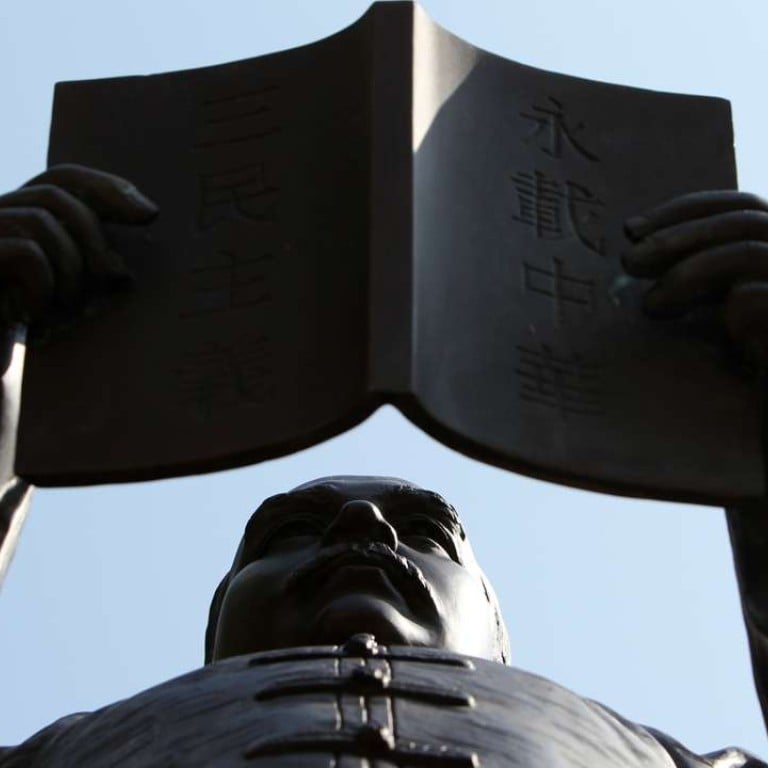
Instead of Queen’s Road Central, let’s have Sun Yat Sen Avenue in Hong Kong. Even the queen may approve
N. Balakrishnan says it’s time some street names were changed to reflect our new political realities. We’d only be doing what the city’s former British rulers are so good at – changing traditions when it suits
There is not a street or road named after Dr Sun Yat-sen in Hong Kong. However, there are streets named after him in Calcutta, India, and in many other places, including even Mauritius.
It is true that there is a museum in Hong Kong about Sun’s life and a statue at the University of Hong Kong, among others, but, considering how important Sun himself considered Hong Kong, it seems strange that he is not more prominent in the city.
In 1923, while speaking at HKU, Sun said: “I feel as though I have returned home, because Hong Kong and the University of Hong Kong are my intellectual birthplace.” Thus, considering how important he regarded Hong Kong, one would have thought that the man who overthrew the world’s oldest feudal social order and monarchy deserves more recognition.
As Oscar Wilde said, those who think clothes are not important should try attending church naked
The Americans honoured George Washington, the man who overthrew British rule, by naming the capital city and even a state after him. Napoleon is everywhere in Paris.
Hong Kong, however, continues to name its main thoroughfare after the self-appointed “Empress of India” Queen Victoria. The fact is that she was living off opium receipts from China, was not democratically elected and punished her subjects who rose up in the “Indian Mutiny” by blowing them up with cannons – even though they may not teach these things in history lessons in Britain or Hong Kong.
Whenever one raises the question of changing colonial names, apologists for colonialism and even some well-intentioned people claim that substance is more important than names. Of course names and appearances are important. As Oscar Wilde said, those who think clothes are not important should try attending church naked!

Hong Kong’s colonial-era postboxes should be treasured, not covered up or destroyed
As for the loyal colonial subjects who think the queen provides “continuity” and stability, and that we should not mess with the old names, I urge them to follow what she does, not what she says.
The British royal family is not averse to changing names to reflect changing political realities. People know the family as the “House of Windsor”. But this is not a name of great antiquity; it was created by King George V on July 17, 1917, when he changed the royal family’s name from the German Saxe-Coburg and Gotha (a branch of the House of Wettin) to the current, English-sounding “Windsor”. The move was political; the first world war was raging and there was a lot of anti-German sentiment in Britain – antiquity and traditions be damned. The fact that Germans were using an aircraft named “Gotha” to bomb Britain only hastened the decision.
Britain’s royal family has survived this long not by being rigid in its traditions, but by shifting with the prevailing political wind
Many in this part of the world are familiar with Lord Mountbatten, the “supreme allied commander of Southeast Asia” and the great-uncle of Prince Charles. But Mountbatten is an invented name too. Mountbatten was a member of the German House of Schleswig-Holstein-Sonderburg-Glücksburg, a branch of the House of Oldenburg. Mountbatten is the English translation of the German “Battenberg”, referring to the town in Hesse.
A more recent change to “traditions” happened in 1997 when Princess Diana, at that time estranged from the royal family, was killed in a car crash in Paris. Previously, it had never been the tradition to fly the Union Flag at Buckingham Palace; only the Royal Standard was flown there, and only when the queen was in residence.
But the British tabloid press was baying for the blood of the “uncaring” queen Elizabeth, and the queen, who was away at Balmoral Castle at the time, decided to fly the Union Flag at half-mast at the palace to honour Diana – another example of how Britain’s royal family has survived this long not by being rigid in its traditions, but by shifting with the prevailing political wind.
This is in stark contrast to the fate of Russia’s royal family, related to Queen Victoria, who refused to shift with the changing times.
So loyal subjects of the queen would be in good company if Hong Kong decided to change some street names to reflect the changed political realities in the city.

Bruce Lee turns 75: Hong Kong’s most famous son, and a legacy that won’t die
With the 100th anniversary of the royal name change to Windsor and the 20th anniversary of Hong Kong’s handover to China next year, it might be a good time to consider some changes to street names.
I have two suggestions: change Queen’s Road Central to Sun Yat Sen Avenue. It is worth noting that Sun was not a mindless “anti-colonialist”; he spoke admiringly of how the British had developed the barren rock of Hong Kong more than the Qing dynasty had developed China.
Second, on Kowloon side, we could change Waterloo Road, commemorating the victory of feudal Britain over Republican France to “Bruce Lee Boulevard” since the road skirts the home of the legendary martial arts movie hero. In this way, we would have one modern, popular name and one featuring a political figure.
Surely no fair-minded person, whether a Hong Kong “localist” or an anti-colonial Communist, would object.
And perhaps even the Queen would approve, at least in private, in keeping with the best of royal traditions.
N. Balakrishnan is a Hong Kong-based businessman

